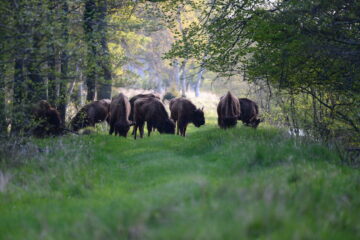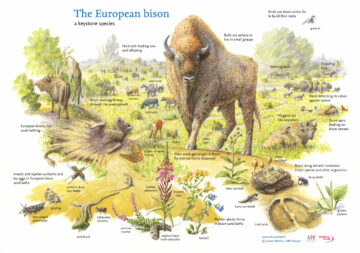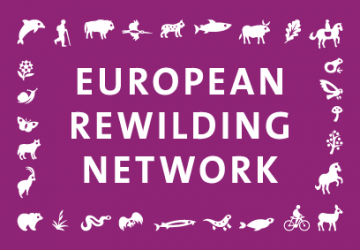This April a herd of seven European bison from the Netherlands arrived at the Lille Vildmose protected area in Denmark, which is a member of the European Rewilding Network. Their presence will help to boost biodiversity and support the health and further growth of the entire European bison population.

Enhancing natural grazing

With an area of over 7,600 hectares, Lille Vildmose (“Little Wild Bog”) is Denmark’s largest protected natural area and the largest remaining raised bog in northwest Europe. The landscape is diverse, comprising open, expansive areas of bog, lakes, fens, birch scrub, forest, plains and mossy areas. These habitats support a healthy population of wild boar and many rare bird species, such as golden eagles, while moose and red deer have recently been reintroduced. The area, which became a member of Rewilding Europe’s European Rewilding Network (ERN) in 2016, is a paradise for nature lovers.
This spring, natural grazing at Lille Vildmose was boosted by the arrival of seven European bison from several nature areas in the Netherlands. The animals, which are a keystone species, will enhance biodiversity at the site through their grazing and further increase the appeal of the area for wildlife enthusiasts. Their arrival will also increase the number of European habitats where bison are present – which is important if the European population of this endangered animal is to continue growing – and help to promote genetic diversity.
Keeping track

The seven bison from the Netherlands join nine bison from Danish reserves, forming one new herd – this will be able to roam freely across 4000 hectares. As this is the equivalent of 6000 football pitches, being able to keep track of the animals easily is important. Five of the new arrivals have been equipped with GPS collars so that the movement of the herd can be continuously monitored.
The GPS collars also give the rewilding team a better insight into how the bison are helping to create wilder nature at the site. European bison help to keep landscapes open by grazing fast-growing grasses and pruning and peeling trees and shrubs. The animals also create sand wallows, in which pioneer plant species and many insects can thrive.
Collaborative efforts

The European bison, which is also known as the wisent, is an endangered species. With free-ranging European bison herds now totalling around 7000 animals, the species is on the European Red List. There are about 70 European bison in the Netherlands, and 25-30 in Denmark. It is not only important that these numbers increase, but that the number of sites where bison are present also increases.
Due to extensive cooperation, European bison have been reintroduced at many European sites in recent years – including Rewilding Europe’s operational areas in the Southern Carpathians and Rhodope Mountains. This has given the bison population a boost; at the end of 2020 the status of the species was changed from “Vulnerable” to “Near Threatened”.
This latest bison transport and release is a result of a unique international collaboration between Dutch and Danish partners, including Aage V. Jensen Naturfond (which owns Lille Vildmose), the Danish Nature Agency, ARK Nature, FREE Nature, Rewilding Europe, Team de Maashorst, Staatsbosbeheer and Flevo-landschap. Several animals of the new herd in Lille Vildmose are part of Rewilding Europe’s European Wildlife Bank, which provides large herbivores for reintroduction into Europe’s natural landscapes to restore natural grazing.
A platform for exchange
 Today rewilding is gaining momentum as a progressive and effective approach to conservation in Europe. Underpinning this trend, the burgeoning ERN continues to foster collaboration and amplify results.
Today rewilding is gaining momentum as a progressive and effective approach to conservation in Europe. Underpinning this trend, the burgeoning ERN continues to foster collaboration and amplify results.
Founded by Rewilding Europe in 2013, the aim of the ERN is to enhance the efforts of each member by facilitating the exchange of skills, insight and experience. Members meet regularly, usually via webinar, while nature-based businesses can also apply to Rewilding Europe Capital, Rewilding Europe’s enterprise loan facility.
Rewilding Europe extends a warm welcome to all European rewilding initiatives that focus on practical, result-oriented rewilding and encourages them to apply for ERN membership.
